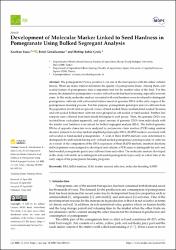| dc.contributor.author | Yazıcı, Keziban | |
| dc.contributor.author | Gönülkırmaz, Betül | |
| dc.contributor.author | Çevik, Mehtap Şahin | |
| dc.date.accessioned | 2023-08-22T08:11:54Z | |
| dc.date.available | 2023-08-22T08:11:54Z | |
| dc.date.issued | 2023 | en_US |
| dc.identifier.citation | Yazıcı, K., Gönülkırmaz, B., & Şahin Çevik, M. (2023). Development of Molecular Marker Linked to Seed Hardness in Pomegranate Using Bulked Segregant Analysis. Life (Basel, Switzerland), 13(5), 1123. https://doi.org/10.3390/life13051123 | en_US |
| dc.identifier.isbn | 2075-1729 | |
| dc.identifier.uri | https://doi.org/10.3390/life13051123 | |
| dc.identifier.uri | https://hdl.handle.net/11436/8100 | |
| dc.description.abstract | The pomegranate (Punica granatum L.) is one of the fruit species with the oldest cultural history. There are many traits to determine the quality of pomegranate fruits. Among them, soft-seeded feature of pomegranate fruit is important trait for the market value of the fruit. For this reason, the demand for pomegranate varieties with soft seeds has been increasing, especially in recent years. In this study, molecular markers associated with seed hardness were developed to distinguish pomegranate cultivars with soft-seeded feature based on genomic DNA at the early stages of the pomegranate breeding process. For this purpose, pomegranate genotypes and/or cultivars from the population involved in reciprocal crosses of hard-seeded Ernar, medium-hard-seeded Hicaznar, and soft-seeded Fellahyemez cultivars were grouped as soft-seeded or hard-seeded. Further, leaf samples were collected from individuals belonging to each group. Then, the genomic DNA was isolated from each plant separately, and equal amount of genomic DNA from individuals with the similar seed hardness were mixed for bulked segregant analysis (BSA). The bulked genomic DNAs of opposite characters were analyzed by polymerase chain reaction (PCR) using random decamer primers to develop random amplified polymorphic DNA (RAPD) markers associated with soft-seeded or hard-seeded pomegranates. A total of three RAPD markers were determined to distinguish the individuals having soft- or hard-seeded pomegranate genotypes and/or cultivars. As a result of the comparison of the DNA sequences of these RAPD markers, insertion-deletions (inDels) primers were designed to developed and validate a PCR assay to distinguish the soft- and hard-seeded pomegranate genotypes/cultivars from each other. The molecular markers developed in this study will enable us to distinguish soft-seeded pomegranate types easily in a short time at the early stages of the pomegranate breeding programs. | en_US |
| dc.language.iso | eng | en_US |
| dc.publisher | MDPI | en_US |
| dc.rights | info:eu-repo/semantics/openAccess | en_US |
| dc.subject | BSA | en_US |
| dc.subject | InDel markers | en_US |
| dc.subject | MAS | en_US |
| dc.subject | Marker assisted selection | en_US |
| dc.subject | Molecular breeding | en_US |
| dc.subject | RAPD | en_US |
| dc.title | Development of molecular marker linked to seed hardness in pomegranate using bulked segregant analysis | en_US |
| dc.type | article | en_US |
| dc.contributor.department | RTEÜ, Ziraat Fakültesi, Bahçe Bitkileri Bölümü | en_US |
| dc.contributor.institutionauthor | Yazıcı, Keziban | |
| dc.identifier.doi | 10.3390/life13051123 | en_US |
| dc.identifier.volume | 13 | en_US |
| dc.identifier.issue | 5 | en_US |
| dc.identifier.startpage | 1123 | en_US |
| dc.relation.journal | Life-Basel | en_US |
| dc.relation.tubitak | 114O380 | |
| dc.relation.publicationcategory | Makale - Uluslararası Hakemli Dergi - Kurum Öğretim Elemanı | en_US |


















